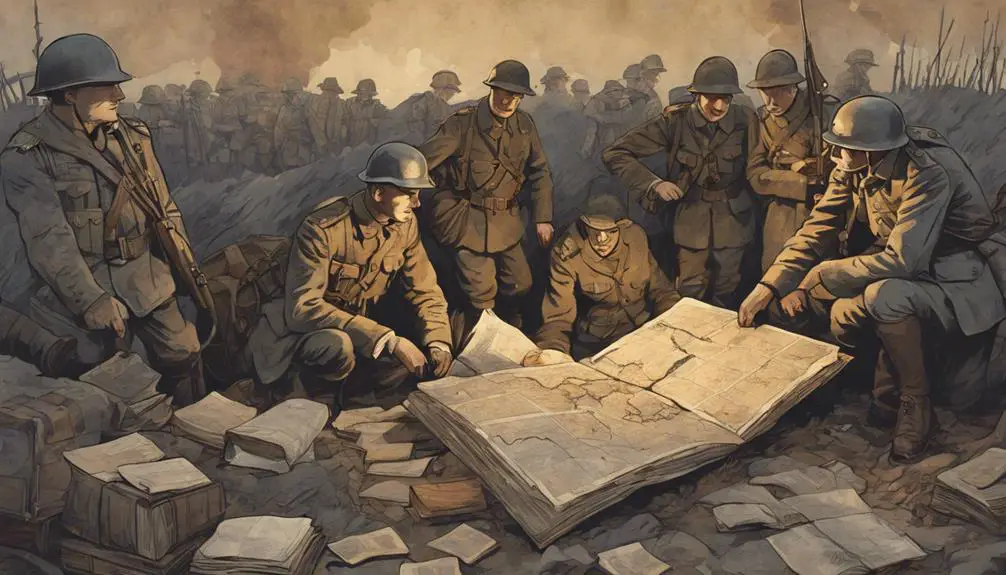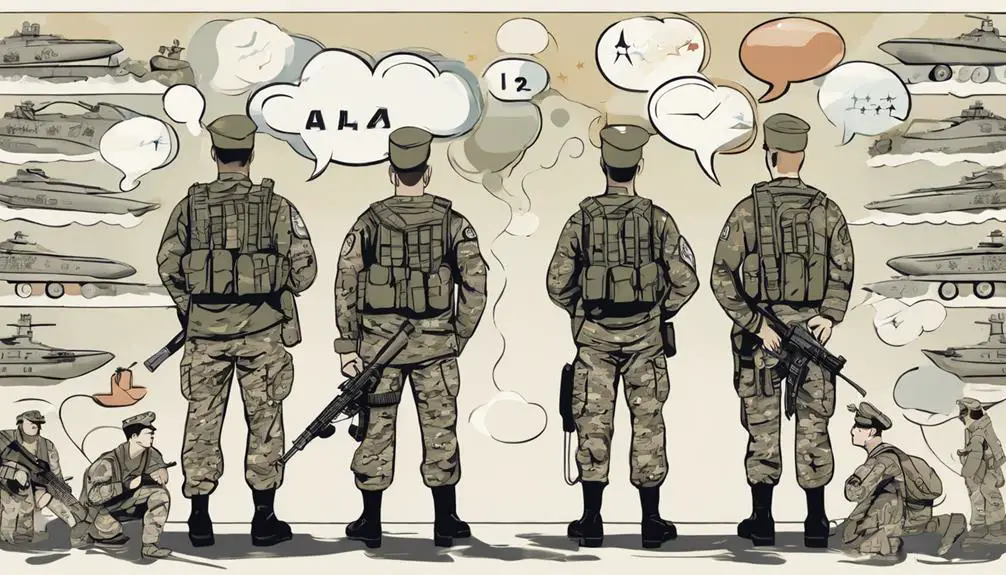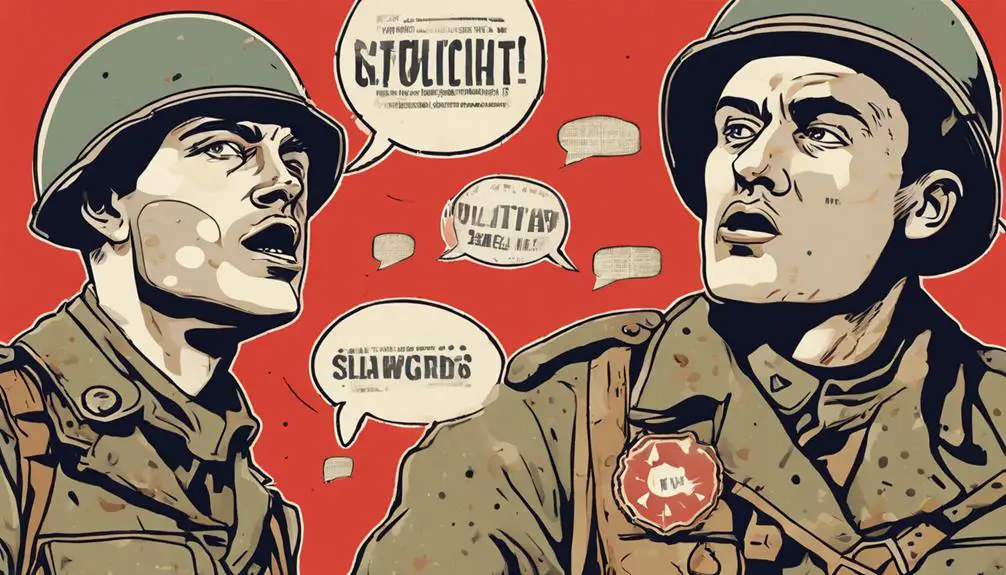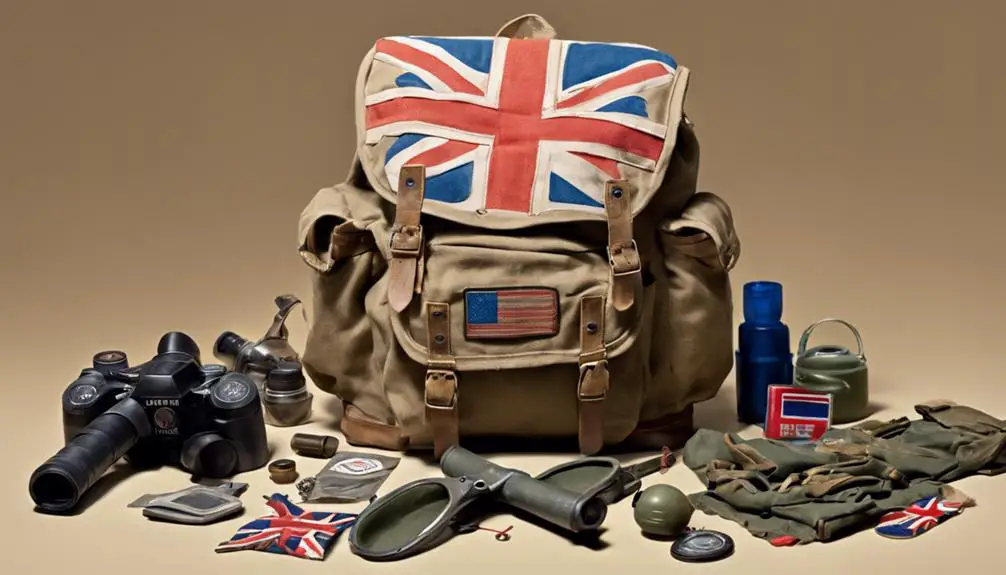You're about to discover the rich language of British military slang, shaped by centuries of cultural exchange and colonial influence. From the 16th century, soldiers in the British Army developed slang that incorporated foreign words and phrases. You'll learn essential phrases like 'brew up' for taking a break and 'crack on' for getting moving. Each branch – Army, Royal Navy, and Royal Air Force – has its unique slang, reflecting its culture and operations. As you explore further, you'll uncover the fascinating evolution of military slang, influenced by shifting operational environments and cultural exchange, and uncover more nuances of this complex language.
Origins of Military Slang

When you explore the world of British military slang, it's important to understand that its origins are deeply rooted in the nation's rich military history, dating back to the 16th century when the first recorded use of slang emerged among soldiers in the British Army.
This historical roots of British military slang are intertwined with the country's cultural influences, shaped by the experiences of soldiers during times of war and peace. As you investigate further, you'll discover that the development of slang was largely influenced by the social and cultural context of the time.
During the 17th and 18th centuries, the British Empire's expansion led to cultural exchange with various colonies, resulting in the incorporation of foreign words and phrases into military vocabulary. This cultural fusion is evident in the use of words like 'loot' (derived from the Hindi word 'lut'), which originated during the British colonial era in India.
The blending of languages and cultural practices has contributed greatly to the unique flavor of British military slang. By understanding these historical roots and cultural influences, you'll gain a deeper appreciation for the complexities of British military slang.
Essential Phrases to Know
You'll need to familiarize yourself with a range of essential phrases that have become an integral part of British military slang, phrases that can help you navigate everyday conversations with military personnel. Mastering these phrases will enable you to communicate effectively and avoid misunderstandings. In the world of military lingo, understanding these essential phrases is vital to building rapport and trust with soldiers.
| Phrase | Meaning | Situation |
|---|---|---|
| 'Brew up' | Take a break | During a patrol or exercise |
| 'Crack on' | Get moving | When it's time to start a task |
| 'Debrief' | Review an operation | After a mission or exercise |
These phrases are just a few examples of the essential phrases you should know when communicating with military personnel. When you use soldier speak, you demonstrate your understanding of military culture and show respect for their profession. By incorporating these phrases into your vocabulary, you'll be better equipped to communicate effectively and build strong relationships with military personnel.
Slang in Different Branches

Different branches of the British military, such as the Army, Royal Navy, and Royal Air Force, have developed unique slang that reflects their distinct cultures and operations. As you explore the world of British military slang, you'll notice that each branch has its own distinct flavor. For instance, the Royal Navy has its own lingo, which often revolves around nautical terms. You might hear phrases like 'scran' for food or 'gash' for rubbish.
The Army, on the other hand, has its own argot, with terms like 'squaddie' for a soldier or 'brew' for a cup of tea. The Royal Air Force has its own slang as well, with phrases like 'bogies' for enemy aircraft or 'scram' for an emergency takeoff.
What's fascinating is how these unique dialects have evolved to reflect the specific challenges and experiences of each branch. By understanding the slang of each branch, you can gain insight into the culture and values of each military community. Whether you're interested in the Royal Navy's saltwater slang or the Army's battle-hardened argot, exploring the world of British military slang is a fascinating journey that reveals the diversity and complexity of the British military.
Decoding Military Jargon
As you explore the nuances of British military slang, you'll find that decoding military jargon requires a thorough understanding of the cultural context and operational realities that shape the language. It's not just about learning a list of colloquialisms; you need to comprehend the underlying dynamics that give rise to this coded language.
Jargon barriers can be significant, especially for outsiders trying to penetrate the military's inner circle. That's because military slang is often rooted in shared experiences, traditions, and technical knowledge unique to the armed forces.
To overcome these barriers, you must investigate further into the culture and history of the British military.
Evolution of Slang Over Time

As you explore the world of British military slang, you'll notice that it has undergone significant transformations over the decades, influenced by shifting operational environments, technological advancements, and cultural exchange.
Historical influences have played a significant role in shaping military slang, with words and phrases borrowed from various conflicts and campaigns. For instance, the British Empire's colonial past has contributed to the adoption of words from indigenous languages, such as 'thug' from Hindi.
Cultural assimilation has also had a profound impact on military slang. As soldiers from diverse backgrounds interact and work together, they bring with them their unique cultural nuances and languages. This cultural exchange has led to the creation of new slang terms and the adaptation of existing ones. For example, the term 'squaddie' originated from the slang used by British soldiers in the 19th century, while 'gutted' (meaning extremely disappointed) has its roots in naval slang.
The evolution of military slang is a continuous process, reflecting the dynamic nature of the military and its cultural landscape. As you explore the world of British military slang, you'll discover a rich tapestry of historical influences and cultural assimilation.
Frequently Asked Questions
Can Civilians Use British Military Slang in Informal Settings?
When using slang from a specific cultural group, like the military, you're walking a fine line. While you might think it's cool to throw around terms like 'squaddie' or 'gutted,' you're risking cultural appropriation.
In informal settings, using military slang without being part of that community can be seen as disrespectful. Consider social norms: would you use terms from a culture that's not yours without understanding the context?
Be mindful of your words' impact and avoid appropriation.
Is British Military Slang Used in Other English-Speaking Countries?
You might wonder if military slang is unique to the UK. In reality, it's not. You'll find that other English-speaking countries have adopted similar lingo.
For instance, Australian influence has led to the use of 'fair dinkum' (meaning genuine) in informal settings. Meanwhile, Canadian adoption of British military slang is evident in words like 'gobsmacked' (utterly shocked).
It's clear that military slang has transcended borders, reflecting cultural exchange and linguistic evolution.
Are There Any British Military Slang Words Banned in Formal Reports?
You might think that censorship policies in formal reports are strict, but surprisingly, there's some flexibility.
When it comes to sensitive terminology, certain words are indeed banned to maintain professionalism. However, in the context of British military slang, some words are tolerated, especially if they're integral to the report's clarity.
While there's no exhaustive list of banned slang, it's clear that discretion is key, and nuance is essential in determining what's acceptable and what's not.
Can British Military Slang Be Used in Formal Military Communications?
When it comes to formal military communications, you'll need to be mindful of the language you use.
In general, formal protocols dictate that official reports and messages should avoid colloquialisms and slang. This is because they can create communication barriers, leading to misinterpretation or confusion.
In a formal setting, clarity is key, and using standard, universally understood language guarantees that your message gets across effectively.
Are There Any British Military Slang Words With Offensive Origins?
When exploring slang terms, you'll often uncover offensive etymology. This is particularly true when examining words with historical roots in colonialism, racism, or sexism.
In such cases, it's crucial to take into account the historical context in which these words emerged. You must acknowledge the harm and oppression associated with these terms, even if they're no longer used with malicious intent.
Conclusion
You've now got a deeper understanding of British military slang, from its origins to its nuances across different branches.
One striking fact: did you know that during World War I, the British Army lost more than 700,000 soldiers, with many of their slang terms becoming a lasting legacy to their sacrifice?
As you explore this unique language, remember the brave men and women who coined these phrases in the face of adversity.







